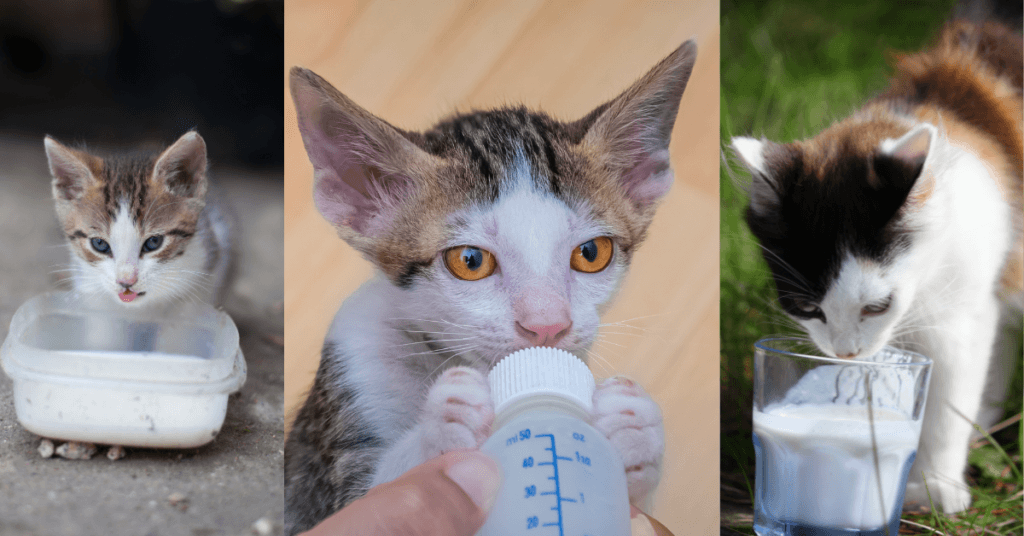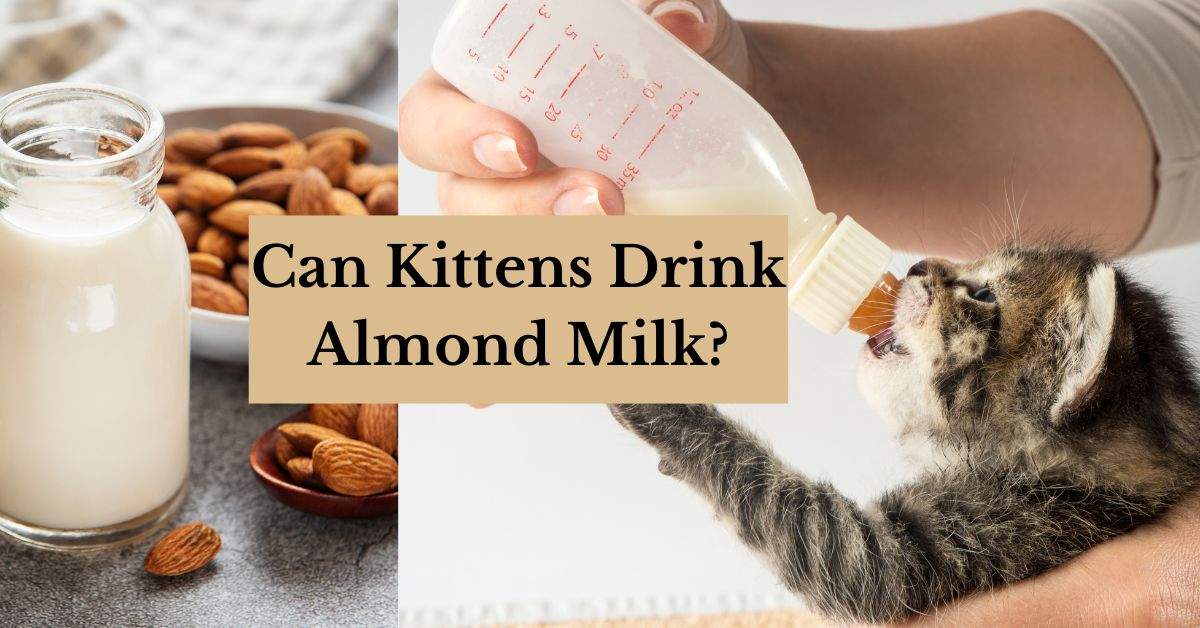As anyone who has ever owned a kitten knows, these furry little creatures are unique in many ways. They have their own personalities, and they require specific care in order to stay healthy. One important aspect of caring for a kitten is making sure that they get the proper nutrition
Kittens, being obligate carnivores, can only properly use the proteins found in animal sources. This means that they require a diet that is high in animal protein and fat, and low in carbohydrates. While this may seem like a lot to remember, it’s actually quite simple: just make sure that your kittens food contains more meat than anything else.
So, now that we’ve covered the basics of feline nutrition, let’s get back to the question at hand: can kittens drink almond milk? In this blog section, we’ll provide information about kittens and their nutritional needs, as well as offer my own thoughts on the matter.
Can Kittens Drink Almond Milk?

Yes, kittens can drink almond milk. In fact, many kitten owners opt to feed their pets almond milk because, when compared to cow’s milk, it’s a far better option for your kittens’ health.
Almond milk is packed with essential nutrients that are vital for a kitten’s growth and development. Plus, it has lesser calories and fat than cow’s milk, making it an ideal choice for kittens who are watching their weight.
How Do I Introduce Almond Milk To My Cats?
If you’re considering adding almond milk to your cat’s diet, it’s important to introduce it slowly and in small amounts.
- Mix a little almond milk into your cat’s regular wet food or give it to them as a treat.
- Once they’ve become accustomed to the taste, you can start giving them larger amounts.
Almond milk is high in protein and essential vitamins and minerals, making it a good choice for those cats who are lactose intolerant or have allergies.
Health Benefits Of Almond Milk:
Almond milk is a fantastic substitute for cow’s milk for those kittens who are lactose intolerant. Not only is it delicious, but it also has a number of health benefits.
It is nutritious
Almond milk is a good source of:
- Vitamins ( vitamin, D and E).
- Minerals (calcium, and magnesium).
It is also low in calories and fat, and it contains no cholesterol.
Lowers the risk of obesity in Kittens:
Almond milk has been found to boost heart health and decrease cholesterol levels in several scientific studies. It may also help reduce the risk of obesity, cancer and other chronic diseases.
As a result, almond milk is a fantastic substitute for regular milk that is far healthier. I urge you to try it now.
Why Is Almond Milk Preferable To Dairy Milk?
There are a number of reasons almond milk is preferable to dairy milk
- Dairy milk is high in saturated fat and cholesterol. Almond milk is much lower in saturated fat and does not contain any cholesterol.
- Dairy milk also contains excessive growth hormones and antibiotics that can be harmful to your health. Almond milk does not contain any of these harmful substances.
- Dairy milk is difficult to digest due to the lactose content. Almond milk is much easier to digest and is also a good source of vitamins and minerals.
When Is Almond Milk Not Recommended For Kittens?
There are a few conditions in which almond milk is not recommended for kittens.
- If your kitten is lactose intolerant, they will not be able to properly digest almond milk.
- If your kitten has certain medical conditions such as kidney disease, they may need to avoid almond milk due to the high levels of phosphorus.
- Kittens under the age of six months should not consume almond milk as it does not provide them with the necessary nutrients for proper growth and development.
Always check with your vet before giving your cat almond milk if you’re uncertain.
Sweetened or Unsweetened Almond Milk? What should I prefer for my kittens?
There are a lot of types of almond milk in the market these days. Some are sweetened while others are unsweetened. So, which one should you get for your kittens?
The answer really depends on your kittens. If they have a sweet tooth, then you might want to go for the sweetened almond milk. However, if they prefer something more natural, then the unsweetened almond milk might be a better option. Of course, you can always experiment and see which type of almond milk your kittens prefer. Ultimately, the decision is up to you!

Making Homemade Almond Milk For Kittens:
If you have a kitten, you may be wondering if it’s okay for them to drink almond milk. The answer is yes, kittens can drink almond milk! In fact, it’s actually quite good for them.
Here’s how to make homemade almond milk for your kitten:
Ingredients:
- 1 cup raw almonds, soaked overnight
- 4 cups water
Instructions:
- The almonds should be drained and rinsed.
- Secondly, put the almonds and water in a blender and whirl them around until completely smooth.
- Pour the mixture through a cheese cloth or strainer into a clean jar or container.
- . Store the almond milk in the fridge for up to 5 days. Serve chilled.
Note: You can also add a little honey to the almond milk to make it even more delicious for your kitten!
Some Precautions To Consider With Kittens And Almond Milk
As with any new food you introduce to your kitten, it’s important to take some precautions when feeding them almond milk. While most kittens will do just fine drinking this type of milk, there are a few things to keep in mind.
- First, make sure the almond milk you’re giving them is unsweetened. Too much sugar can cause stomach upset in kittens, so it’s best to avoid sweetened varieties.
- Second, start slowly when giving your kitten almond milk. Give them a small amount at first to see how they tolerate it. If they seem to be doing well, you can gradually increase the amount they’re drinking.
- Finally, pay close attention to your kitten’s stool after they drink almond milk. If you notice any changes in their bowel movements or they seem to be having tummy trouble, stop giving them the milk and consult your veterinarian.
FAQ’s
Is it dangerous to give kittens almond milk when they’re younger?
Many people are unsure if it is safe to give kittens almond milk. The answer largely depends on how old the kitten is.
It is generally considered unsafe to give kittens under the age of six months old almond milk. This can lead to gastrointestinal issues such as vomiting and diarrhea. However, if the kitten is over six months old, almond milk is generally considered safe. Just be sure to check with your veterinarian first to make sure it’s okay for your specific kitten.
If my kitten accidentally drinks too much almond milk what should i do?
If your kitten drinks too much almond milk, it’s important to seek professional medical help immediately as they could be at risk for dehydration.
If possible, try to give them small sips of water or milk to drink and keep them calm until you can get them to the vet. There are a number of potential health risks associated with consuming too much almond milk, so it’s crucial that you seek help right away.
Will it be dangerous if I give kittens almond milk?
You should not give almond milk to your baby kittens. Kittens are unable to digest the lactose in almond milk, which can lead to an upset stomach and diarrhea. If you must give your kitten milk, opt for a kitten formula that is specifically designed for their nutritional needs.
Conclusion
In conclusion, almond milk can be a safe and healthy option for kittens, as long as it is given in moderation. Kittens should always have access to fresh water, and milk should only be given as a treat. If you do decide to give your kitten almond milk, make sure to choose a product that is unsweetened and contains no added sugars.




